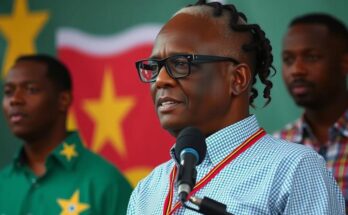Yamandú Orsi wins Uruguay’s presidency in a narrow election victory over Álvaro Delgado, signaling a return to power for the leftist Broad Front party after their loss in 2019. Orsi, a former history teacher, intends to address high poverty rates and crime, promoting unity and progressive policies reminiscent of former president Pepe Mujica. The election saw a near 90 percent voter turnout, emphasizing democratic engagement in the country.
Yamandú Orsi has emerged victorious in Uruguay’s presidential election, marking a significant political shift as the leftist Broad Front party returns to power after losing to the center-right National Party in 2019. In a tightly contested runoff against Álvaro Delgado, Orsi garnered 49.8 percent of the vote compared to Delgado’s 45.9 percent. This election saw robust voter turnout near 90 percent, reflecting the country’s compulsory voting laws. Orsi, a former history teacher and mayor, plans to unify the nation and address pressing issues such as poverty and crime, building upon the previous administration’s achievements under former president José “Pepe” Mujica, who is renowned for his progressive social policies.
With a strong campaign based on consistency and moderation, Orsi has positioned himself as a proponent of collaboration and inclusivity, indicating his readiness to dialogue with all sectors of society. “The country of liberty, equality and fraternity has triumphed once again,” he declared to his supporters. As he prepares to assume office on March 1, 2025, Orsi also faces critical challenges, including rising child poverty and the influence of organized crime gangs. Overall, this election embodies a larger trend of shifting political dynamics worldwide, favoring opposition candidates in various nations.
Uruguay, a democratic nation of approximately 3.4 million people, has a history rooted in progressive politics, particularly during the long tenure of the Broad Front party, which governed from 2004 until 2019. The recent election reflects a critical moment of political resurgence for the left as Yamandú Orsi’s victory signifies a returning inclination towards social welfare and economic inclusion. Given the complexities of contemporary governance, including the ramifications of poverty and crime, Orsi’s leadership will be pivotal in influencing future policy directions within the country. Moreover, the legacy of former president Pepe Mujica has set high expectations regarding social reforms and liberal policies.
The election of Yamandú Orsi as president represents a significant ideological shift back toward leftist governance in Uruguay after a period of center-right rule. Orsi’s commitment to unity and dialogue suggests a collaborative approach to addressing critical issues like poverty and crime that plague the nation. His leadership, inspired by the progressive legacy of José Mujica, indicates a potential for renewed social and economic reforms, while the high voter turnout underscores the political engagement of Uruguayan citizens. The upcoming years under Orsi’s administration will be crucial in shaping the future trajectory of the nation.
Original Source: www.newsweek.com



